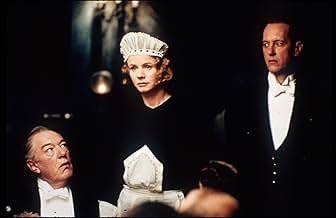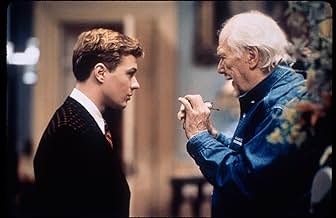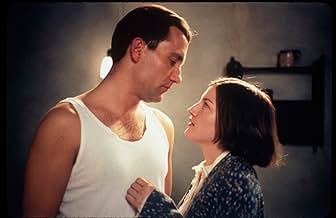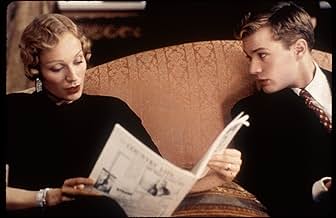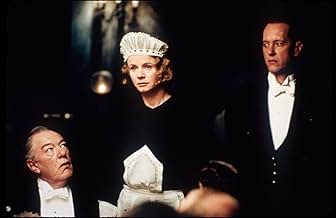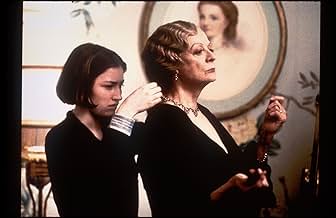Le vite degli ospiti al piano di sopra e dei servitori al piano di sotto a una festa nel 1932 in una casa di campagna in Inghilterra mentre indagano su un omicidio che coinvolge uno di loro.Le vite degli ospiti al piano di sopra e dei servitori al piano di sotto a una festa nel 1932 in una casa di campagna in Inghilterra mentre indagano su un omicidio che coinvolge uno di loro.Le vite degli ospiti al piano di sopra e dei servitori al piano di sotto a una festa nel 1932 in una casa di campagna in Inghilterra mentre indagano su un omicidio che coinvolge uno di loro.
- Regia
- Sceneggiatura
- Star
- Vincitore di 1 Oscar
- 36 vittorie e 74 candidature totali
Recensioni in evidenza
Bob Balaban and Robert Altmann story idea combined with Fellowes's eloquent writing is first rate. The dialogues are filled with wit, humour and subtle depth. The mansion itself plays a key character in the story but it is the spellbinding cinematography that functions as the mansion's eyes. The camera is constantly on the move and the viewer feels like an ignored but curious member of the crowd. Many themes are tackled in the movie but it is done quietly. The film also slowly demonstrates the disintegration of the English class system (that started around the war).
Altman has assembled a mountain of talented actors that include a bitchy Maggie Smith, a pompous Michael Gambon, an obnoxious Kristin Scott Thomas, a vulnerable Camilla Rutherford, a desperate Tom Hollander, a devil-may-care Geraldine Somerville, a knows-where-he-stands Jeremy Northam, a douchebag Bob Balaban, a horny Ryan Phillipe, a stupid Stephen Fry, a loyal Sophie Thompson, a principled Helen Mirren, an enigmatic Clive Owen, a no-nonsense Emily Watson, a not-to-be-messed-with Richard E. Grant, a pulling-it-together Derek Jacobi, a frightened Alan Bates, a grumpy Eileen Atkins and an adorable Kelly Macdonald. 'Gosford Park' has one of the best ensemble cast.
I also loved the soundtrack. It is never overdone. The jazzy tracks contribute well in setting the atmosphere and there are some wonderful songs performed by Jeremy Northam's character.
In the beginning, it is a little difficult to keep up with the names of the characters which leads to a bit of confusion but with a little bit of patience, once you're over that, it becomes easy to follow. Like a beautiful painting, once it captivates the viewers attention it immediately involves them in an alternate world. From the start, you feel like an ignored guest and at the end it's as though the host has just seen you out.
Altman's preferences for kaleidoscopic social observation has sometimes failed in the past due to the weight of its own ambition: multi-plotted and multi-charactered snapshots of time and place held together by loose ties or a general thematic framework. Sometimes it pays off spectacularly (Nashville); sometimes it flatters to deceive (Short Cuts).
It works well here due to the necessary discipline of the single location and the greater opportunities for interaction among the characters this affords. Add to that an exemplary cast of (mostly) British character actors and a knowing script by Julian Fellowes that gives Altman's keenly observant camera plenty of time to make its own points.
Rightly, Altman is less concerned with the murder mystery, which is almost an aside, than with the opportunity given by a shooting party at a 1930s stately mansion to observe the English aristocracy and their servants in social interaction.
Never happier than when involved in a bit of human anthropology, Altman lightly dissects the complexities and hierarchies which go on both above and below stairs; in which many subtle and unsubtle rituals are played out among groups of people who clearly dislike each other but are forced through circumstance, need or employment to observe the fundamental social practices required.
1932 is also a time of intruding change into the nature of the old English ruling classes, slowly disintegrating in this between-wars period and, in this case, largely reliant on the wealth of one particularly reluctant patron to keep them in furs and flunkies. In on this act comes the (to them) faintly odious whiff of 20th century new money, represented by Hollywood and popular culture. These intruders are kept in their place, but the message is clear - change is coming, and coming fast.
The muted colours and autumnal setting continue this theme of a world in terminal decline and of a group of characters keenly conscious of place and tradition yet also wearied and exhausted by it. Only at the very end, when fundamental change has occurred and many characters are left to face up to very different destinies do we see a bit of sunshine creeping in, heralding the dawn of a new era.
The cast are all excellent, with special mention deserving of Maggie Smith's effortless scene stealing as a bitchy but broke old Countess; the ever reliable Jeremy Northam as matinee idol Ivor Novello, well aware of his place in the great scheme of things and young Kelly Macdonald in the pivotal role of Smith's harassed maid who's inquisitiveness rattles a whole load of family skeletons.
One of the best aspects of film is how it illustrates that fine line dividing the master-servant social structures, and how often that line is crossed, reminding us that life is just a game of costumes and masks, and we're all the same underneath. While the story was reminiscent of Agatha Christie's Ten Little Indians, where it's the mystery that captivates the audience, Altman goes beyond the mystery with Gosford Park by using the murder as a vehicle to draw attention to the human condition and class hierarchy.
On the downside, but to no surprise to fans of Altman's work, the movie is often hard to follow. His style of filmmaking involves entanglements of characters and subplots that don't appear to have much to do with one another at first blush, and Gosford Park takes this to the next level. Here, the murder takes place at the climax of this confusion, leaving you rather disoriented in the middle of the 2-hour-plus drama. Fortunately, the tone loosens up when a comedy-dim police inspector basically gets nowhere in his investigation, but the pieces start coming together through the other characters. The good news is that it all seems to come together in the end in a way that didn't require grasping every detail of every scene.
Despite its intricacies and confusing moments, there is so much more to Gosford Park that makes it interesting and enchanting. While it is clearly a sophisticated piece of film work with impeccable acting, directing and design, don't stress about not keeping up with it all the time. Sit back and take it in, and you'll feel satisfied in the end.
The film admittedly stinks as a murder mystery---it's almost funny how little Altman himself seems interested in the who-dunnit. But, typically for Altman, it's the deconstruction of the genre that he's interested in, not the genre itself. This movie isn't about a murder in a country house; it's a movie about class differences and people connecting (or not connecting) with one another.
It seems futile to mention stand out performances in a film filled to the rafters with stand-out performances, but I did especially like Emily Watson as a cheeky maid, Helen Mirren as the "perfect servant," and Kelly MacDonald as the novice lady's attendant who grows more than anyone else over the course of the film.
The film is at its best when it's probing the emotional depths of the story---it comes across as a bit too glib when the satire gets especially acidic (mostly with the Kristin Scott Thomas character), but like the best of his movies ("Nashville," "M*A*S*H," "Short Cuts") Altman knows how to control his own cynicism and doesn't let sarcasm rule.
With his on again-off again track record, we can expect the next Altman film to tank, so let's enjoy this one while we can.
The story moves on as the characters begin to establish their names and the audience learns their varying social status. The intertwining stories among the guests begin to surface and the audience begins to realize there is much more in this house than what meets the eye.
During the night one member of the elite group is killed. None of the guests seemed to be fazed by this event and are only upset by the inconvenience it sets up for their lives.
The only one troubled is Constance, Countess of Trentham's maid, Mary (Kelly McDonald). The story begins to focus on Mary, who discovers secrets among the visitors and leads the audience to solve the mystery.
The great aspect about this film is Robert Altman's abilities to bring the past to life. He pays excellent attention to detail and is able to recreate the feelings and morals during the time period. He emerges the audience into a film world filled with history and story. Throughout the film Altman visually shows the audience the contrast between social classes through his various shots, lighting techniques, and camera filters. His fluid camera movements visually portray foreshadowing and relationship among characters. These elements give the audience a complete understanding of the mood and atmosphere in the film.
I recommend this movie to anybody who has the patience to sit and focus on this excellent film. Although the beginning is appropriately slow moving and the characters names are difficult to remember, the payoff is worth the efforts. This movie is made for active film viewers and all Robert Altman fans.
Lo sapevi?
- QuizThe camera is always moving (if only slightly) in every shot as requested by producer and director Robert Altman.
- BlooperThe movie takes place in 1932 but some of the songs Ivor Novello sings for the guests didn't come out until years after, like "Glamorous Night" (1935), "Why It Wasn't You" (1937), "I Can Give You a Starlight" (1939) and "Waltz of My Heart" (1939).
- Citazioni
[Morris Weissman is asked about his upcoming movie project]
Lady Sylvia McCordle: Mr Weissman.
Morris Weissman: Yes?
Lady Sylvia McCordle: Tell us about the film you're going to make.
Morris Weissman: Oh, sure. It's called "Charlie Chan In London". It's a detective story.
Mabel Nesbitt: Set in London?
Morris Weissman: Well, not really. Most of it takes place at a shooting party in a country house. Sort of like this one, actually. Murder in the middle of the night, a lot of guests for the weekend, everyone's a suspect. You know, that sort of thing.
Constance: How horrid. And who turns out to have done it?
Morris Weissman: Oh, I couldn't tell you that. It would spoil it for you.
Constance: Oh, but none of us will see it.
- Curiosità sui creditiThe cast credits at the end are separated between above stairs, visitors and below stairs, arguably listed in order of status within the British class system.
- Colonne sonoreWaltz of My Heart
Performed by Christopher Northam
Composed by Ivor Novello & Christopher Hassall (as Christopher V. Hassall)
© Chappell/Music Limited
By Kind Permission of Warner/Chappell Music Ltd
I più visti
Dettagli
- Data di uscita
- Paesi di origine
- Sito ufficiale
- Lingue
- Celebre anche come
- Muerte a la media noche
- Luoghi delle riprese
- Syon House, Syon Park, Brentford, Middlesex, Inghilterra, Regno Unito(interiors: upstairs bedrooms)
- Aziende produttrici
- Vedi altri crediti dell’azienda su IMDbPro
Botteghino
- Budget
- 19.800.000 USD (previsto)
- Lordo Stati Uniti e Canada
- 41.308.615 USD
- Fine settimana di apertura Stati Uniti e Canada
- 241.219 USD
- 30 dic 2001
- Lordo in tutto il mondo
- 87.754.044 USD
- Tempo di esecuzione
- 2h 17min(137 min)
- Mix di suoni
- Proporzioni
- 2.35 : 1



